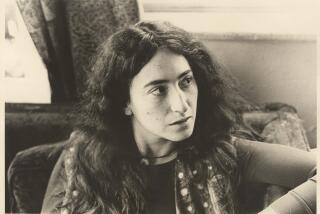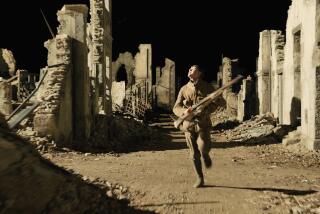Susan Fromberg Schaeffer dies at 71; wrote ‘Buffalo Afternoon’
- Share via
Susan Fromberg Schaeffer, a poet and novelist whose well-regarded 1989 novel “Buffalo Afternoon” examined the Vietnam War and its long and complex echo throughout American life, died Friday in Chicago. She was 71.
Fromberg Schaeffer, who had been a visiting professor at the University of Chicago, suffered a stroke 2 1/2 years ago, forcing her retirement, and never recovered her speech or mobility. A second stroke last week was the cause of death, said her husband, Neil Schaeffer.
The author once said she had been a “radical pessimist” — until she spent several years talking to Vietnam veterans as part of her research for writing “Buffalo Afternoon.” That experience, she said, turned her into “a somewhat hesitant, if not wobbly, optimist.”
Fromberg Schaeffer was born in 1940 in Brooklyn, N.Y., and attended the University of Chicago. She earned an undergraduate degree there in 1961, a master’s in 1963 and a doctorate in 1966.
In 1967 she moved back to her hometown to teach at Brooklyn College, where she met the man who became her husband, an English department colleague. Neil Schaeffer is the author of “The Marquis de Sade: A Life” (1999). They have two adult children.
At Brooklyn College, Fromberg Schaeffer was a mentor to an African American poet named Sapphire, encouraging her to begin her first novel. That novel became the acclaimed “Push” (1996).
Fromberg Schaeffer returned to the University of Chicago in 2004 and served as a visiting professor in the English and creative writing departments.
Along with her 14 novels, which include “The Madness of a Seduced Woman” (1984) and “Poison” (2006), she published six volumes of poetry, two children’s books and many book reviews and critical essays.
Fromberg Schaeffer faced resistance when she undertook a novel about the Vietnam War that became “Buffalo Afternoon.” Some said that a writer who hadn’t seen combat — and who was female, to boot — had no business trying to depict war.
As Fromberg Schaeffer wrote in an essay describing the novel’s gestation, “Everyone believed it could not be done by a woman — as if men would somehow be alien beings to a member of the opposite sex.”
The novel follows Pete Bravado, a young man from an Italian immigrant family who serves in Vietnam and then must come to terms with what he saw and felt. The book is lyrical, but also searing and visceral.
“She got it and she got it right, and somehow managed to squeeze the entire Vietnam experience into one epic narrative,” Nicholas Proffitt wrote in reviewing the book for the New York Times.
Fromberg Schaeffer spent years researching the novel, talking to veterans for hundreds of hours.
Her research for other novels was equally scrupulous and painstaking. She would immerse herself in other lives, other historical periods — “Anya” (1974) was about a Holocaust victim from Poland, and “The Snow Fox” (2004) explored the lives of lovers in medieval Japan — and then, once the information and emotion had been digested, would write in a long frantic dash, her husband recalled.
The author was not sentimental about her profession, once writing in an essay, “Probably writers should forget what it was like to write the last novel, and the one before that, and the one before that, or we should all be plumbers. It must be good to be a plumber. Everyone is happy to see you, and no one reviews your work.”
More to Read
Start your day right
Sign up for Essential California for the L.A. Times biggest news, features and recommendations in your inbox six days a week.
You may occasionally receive promotional content from the Los Angeles Times.




















































